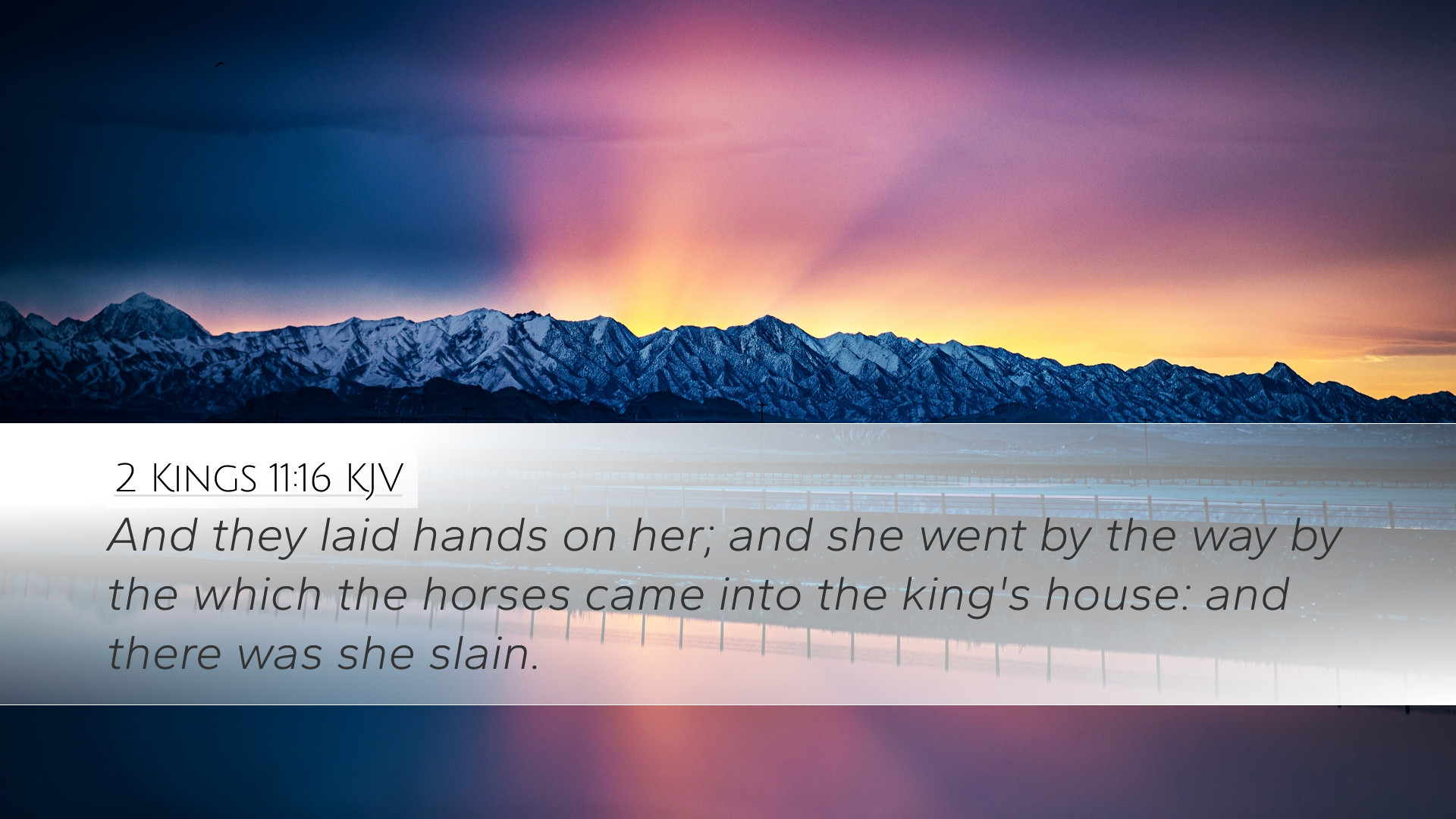Old Testament
Genesis Exodus Leviticus Numbers Deuteronomy Joshua Judges Ruth 1 Samuel 2 Samuel 1 Kings 2 Kings 1 Chronicles 2 Chronicles Ezra Nehemiah Esther Job Psalms Proverbs Ecclesiastes Song of Solomon Isaiah Jeremiah Lamentations Ezekiel Daniel Hosea Joel Amos Obadiah Jonah Micah Nahum Habakkuk Zephaniah Haggai Zechariah Malachi2 Kings 11:16
2 Kings 11:16 KJV
And they laid hands on her; and she went by the way by the which the horses came into the king's house: and there was she slain.
2 Kings 11:16 Bible Commentary
Commentary on 2 Kings 11:16
Verse Reference: 2 Kings 11:16 - "And they made a covenant with her, and she made a covenant with them, and they anointed her queen."
General Overview
This verse captures a pivotal moment in the history of Judah during a time of turmoil and danger. The context reveals the dangerous reign of Athaliah, the mother of Ahaziah, who sought to eliminate any potential threats to her power by killing the royal heirs. However, the narrative also presents a glimmer of hope in the emergence of Queen Athaliah's opposition, revealing themes of faith, covenant, and divine providence.
Insights From Public Domain Commentaries
Matthew Henry's Commentary
Matthew Henry highlights the covenant made between Athaliah and the people as a significant act in legitimizing her authority. He notes that covenants in the ancient Near Eastern context were serious commitments. The willingness of the leaders to unite under the banner of a queen indicates the social and political upheaval that paved the way for a female ruler, an uncommon but not unheard-of phenomenon in the biblical era.
This verse also reflects the aspect of divine providence. Henry posits that God’s guiding hand is evident in the preservation of the Davidic line, as the defeated Queen Athaliah's downfall paves the way for a return to rightful worship practices in Judah.
Albert Barnes' Notes
Albert Barnes elaborates on the notion of covenant, emphasizing that it was a sacred bond that bound the participants to mutual obligations. He notes that the leaders’ decision to support Athaliah was not merely political but was also seen in light of God's plan for Israel. Her anointing signifies both the endorsement of her legitimacy as a ruler and the people's recognition of her divine mandate.
Barnes also discusses the significance of anointing in the biblical tradition. He emphasizes that anointing is a divine selection, often accompanied by the empowerment of the Holy Spirit, enabling the individual to govern righteously. In this context, the act of anointing Athaliah can be viewed as a divine intervention meant to restore order amidst chaos.
Adam Clarke's Commentary
Adam Clarke offers a perspective on the political motivations behind the covenant made with Athaliah. He suggests that the nobles and military leaders, seeing the need for stability after the violent upheaval, chose to rally around her as a means to protect their own interests and retain power.
Clarke also highlights the theological implications of this event, arguing that God permits certain rulers to rise, even those who may not adhere to His will, to accomplish His broader purposes. Athaliah’s reign serves as a stark contrast to the covenant faithfulness expected of the Davidic line and underscores the consequences of turning away from God.
Thematic Analysis
- Covenant and Leadership:
The act of making a covenant signifies the intertwining of religious and political authority. Athaliah's ascent to power reveals the complex dynamics of leadership in ancient Israel where divine and earthly authority often overlap.
- Divine Providence:
This passage illustrates how God's providential care operates through human actions and decisions. The anointing of Athaliah, despite her tyrannical inclinations, becomes a part of God's narrative in preserving the Davidic lineage.
- Gender Dynamics in Leadership:
Athaliah's unique position as a queen in a patriarchal society invites discussions on gender roles within biblical texts. Her reign, though marked by violence and idolatry, challenges conventional notions of authority and showcases the potential for female leaders in ancient Israel.
Conclusion
The verse 2 Kings 11:16 thus serves as a critical juncture in the narrative of Judah's history. By examining the commentaries of Matthew Henry, Albert Barnes, and Adam Clarke, readers can gain rich insights into the complexities of covenantal relationships, divine providence, and the roles of leaders within the socio-political landscape of ancient Israel. The thematic explorations invite deeper reflection on the nature of authority, the consequences of disobedience to God's covenant, and the overarching narrative of redemption within Scripture.


